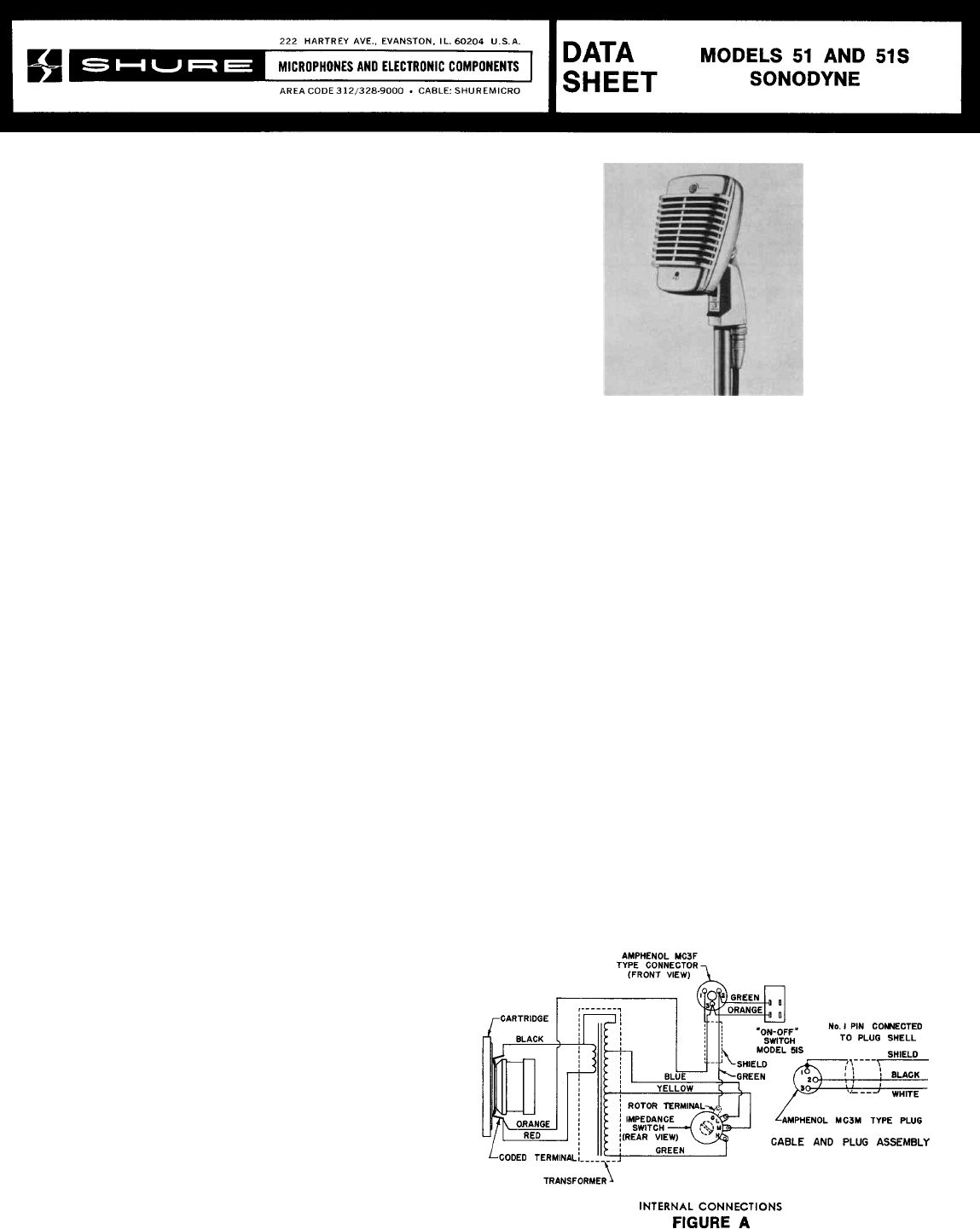
Copyright 1967, Shure Brothers Inc.
27A173 (OVER) Printed in U.S.A.
OMNIDIRECTIONAL DYNAMIC MICROPHONES
General: The Models 51 and 51S are rugged micro-
phones built to provide good reproduction of music
and voice. The microphones are pressure dynamic
type and have omnidirectional pickup characteristics.
The Models 51 and 51S are highly recommended
for tape, wire, and disc recording, fixed or mobile
public address paging systems, amateur communica-
tions and general communication service.
The microphones feature:
§ High output and a response effective for an-
nouncing, narration, vocal music, and combo
groups.
§ A strong detachable cable, especially selected
for good shielding from “hum” pickup.
§ Very rugged mechanical design for reliable
operation under severe conditions of use.
§ A self-tensioning swivel which permits tilting so
microphone can be aimed at source of sound.
§ Built-in “On-Off” switch (Model 51S)
The Models 51 and 51S are multi-impedance for
connecting into microphone inputs rated at 25 to 50
ohms, 150 to 250 ohms, or into high impedance micro-
phone inputs.
The low impedances are recommended where long
cable lengths are required or under conditions of
severe hum disturbance. The permissible cable length
is practically unlimited, since neither response nor
level is appreciably affected. For use with high im-
pedance amplifiers, Shure Model A95A Line Matching
Transformer is available for coupling the low imped-
ance line to the amplifier input.
Impedance Selection
Selection of the various impedances is accomplished
by changing the position of the switch at the front of
the microphone. The switch positions are marked "L"
for low impedance (25-50 ohms), “M” for medium im-
pedance (150-250 ohms), and “H” for high impedance
(35,000 ohms).
OPTIONAL ACCESSORIES
Line Matching Transformer ..............................A95A
Vibration-Isolation Stand..................................S39A
Desk Stand....................................................S36A
Quick-Disconnect Isolation Unit................ Model A47
Guarantee: This Shure product is guaranteed in normal
use to be free from electrical and mechanical defects
for a period of one year from the date of purchase.
Please retain proof of purchase date. This guarantee
includes all parts and labor.
Shipping Instructions: Carefully repack the unit and
return it prepaid to the factory. If outside the United
States, return the unit to your dealer or Authorized
Shure Service Center for repair. The unit will be
returned to you prepaid.
ARCHITECT’S SPECIFICATlONS
The microphone shall be the Shure Model 51S (51)
or equivalent, A moving coil type microphone with a
frequency range of 60 to 10,000 Hz. The microphone
shall have an omnidirectional polar characteristic. The
unit shall have a three-position impedance selection
switch for selecting the microphone rating impedance
f 25-50 ohms, 150-250 ohms, or 35,000 ohms.
The microphone output shall be:
L -- 25-50 ohm impedance........... -51.0 db*
M - 150-250 ohm impedance........ -51.0 db*
H-- High.................................... -48.5 db**
*0 db = 1 milliwatt per 10 microbars
**0 db = 1 volt per microbar
The Model 51S shall have a built-in “On-Off” switch.
The Model 51 shall have no “On-Off” switch. The
microphone rating Gm (sensitivity) at 1,000 Hz. Shall
be within ± 3 db of the following levels:
"L” Position of switch ................. -144.0 db
“M” Position of switch................. -143.0 db
“H” Position of switch................. -145.0 db
EIA Standard Rating SE-105 August 1949
The microphone shall be provided with a swivel ad-
justable from horizontal to 80° backward. It shall have
a detachable cable connector capable of connecting
to a two-conductor shielded cable. The microphone
shall mount on a stand having 5/8"-27 thread. The
overall dimensions shall be 4-17/32” (115.1 mm) high,
3 1/8” (79.4 mm) wide, and 3%” (98.4 mm) deep.
REPLACEMENT COMPONENTS
Cable and Plug Assembly.........................Model C55
Important: Shure Microphone Cables are selected after
exhaustive tests to insure superior performance in
microphones because of low capacities, superior
shielding properties and unusually long life under
severe use.
Cables with plastic insulation should not be sub-
jected to excessive soldering-iron heat. Carefully clean
and tin the conductors and the connections to which
the conductors are to be soldered. The soldering
operation can then be done with a minimum of heat,
thereby avoiding any possibility of damage to the
cable.
